KSEEB 10th English Gentleman of Rio en Medio Lesson Notes Questions and Answers
Check Your Understanding
Share your responses
(Refer to Text Page No. 46 & 47):
Question 1.
The old man was …….. ( Fill in the blank with the most appropriate word)
a. understanding
b. quick
c. unhurried
d. witty
Answer:
(c) unhurried
![]()
Question 2.
Do you think the ancestors of the old man lived in Rio en Medio?
Answer:
Yes. They had lived there because he tilled the land that they had tilled
Question 3.
A word in line 4 of paragraph 1 suggests that the old man was a farmer. Pick that word.
Answer:
The word is tilled the land’.
Question 4.
Study the picture and describe the old man’s orchard by using the words given below.
(a small stream, unpleasant, fruit bearing trees, old fashioned house, attractive )
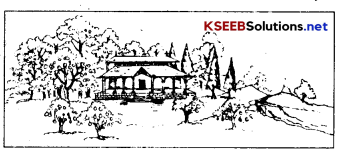
Answer:
Fruit bearing trees, attractive.
![]()
Question 5.
In paragraph 2 the words ” who” and ‘ these ‘ refer to and respectively.
Answer:
Senator catron and the people.
Question 6.
Look at the picture and draw your inference about the old man’s appearance and his social / living condition.
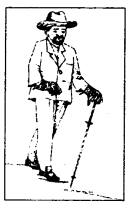
Answer:
He looked like Senator Catron from New Mexico.
He had double-breasted coat. He was an elderly man and was much respected. His coat was old, green and faded. He wore gloves and carried a stick which looked like the skeleton of a worn-out Umbrella.
![]()
Question 7.
The word “innumerable kin” means that the old man had a number of
a. children.
b. trees in his orchard.
c. relatives.
d. followers
e. canes.
Answer:
(a) Children / (d) followers
Question 8.
In the Indian context the eyes of women are compared to fishes (Meenakshi) and lotus (Kamalakshi) based on their shape and size. Why do you think the eyes of the boy are likened to gazelle? Can you write it in Kannada? Note : gazelle in Kannada is (aoors).
Answer:
Because the boy had tiny eyes which looked like the eyes of gazelle.
Question 9.
How did the old man greet the people who had been waiting for him?
Answer:
The old man bowed to all in the room. Then he removed his hat and gloves.
![]()
Question 10.
The old man removed his hat and gloves carefully.
a. Was he afraid that they would get spoiled?
b. Whose style did it remind the writer of?
Answer:
(a) He was not afraid that his hat and gloves would get spoiled.
(b) The writer was reminded of the style of Charlie Chaplin.
(Refer to Text Page No. 48 & 49):
Question 1.
In the meeting of the old man and the Americans, they talked about rain and the old man’s large family. It was
a. to mock his large family
b. to break the ice
c. a custom of the Americans
d. to make themselves comfortable
e. to prepare everyone for the main talk
f. to make everyone know that it had not rained in that area
(You may think more than one among the above are appropriate. If so, tick them)
Answer:
(d) to make themselves comfortable.
![]()
Question 2.
Why do you think the story teller spoke Spanish?
Answer:
He was an American and knew Spanish. The man was from Mexico and he understood it.
Question 3.
The story teller offered the old man almost the double of what he had quoted earlier. Why?
Answer:
Because he found out that the old man had more than eight acres of land. But the pact was agreed for only eight acres.
Question 4.
What was the reaction of the old man to the story teller’s offer?
Answer:
The story teller offered Don Anselmo more money than what had been agree upon and Don Anselmo felt offended when he came to know this.
![]()
Question 5.
We respect elders in many ways. For example
a. We shake hands
b. We touch their feet
Answer:
c. We remove our hat.
d. We bend down.
e. We salute them.
f. We smile with respect.
Question 6.
The story teller respected the old man by …………. (Fill in the blanks with appropriate words)
Answer:
keeping silent
Question 7.
After the findings of the engine, r the offer was doubled for the old man’s land.
a. Did the old man raise the rate?
b. Did the story teller offer more?
Answer:
The story teller offered more because the old man’s land was just not only eight acres but more.
Question 8.
Match the following.
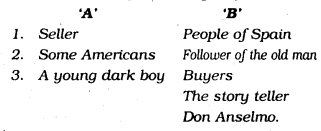
Answer:
‘A’ — ‘B’
1. Seller — Don Anselmo
2. Some Americans — Buyers
3. A young dark boy — Follower of the old-man
![]()
Question 9.
Don Anselmo took only 12 hundred dollars for the land finally because
a. the story teller failed to convince Don Anselmo to take more money than what had been agreed upon.
b. Don Anselmo was a man of principles. (Tick the correct Answer)
Answer:
(b) Don Anselmo was a man of principles.
Question 10.
What did Don Anselmo do as he left the place with money?
Answer:
He signed the deed, took the money and shook hands all around. He put on ragged gloves, took his stick and walked out with the boy behind him.
(Refer to Text Page No. 50 & 51):
Question 1.
Fill in the blanks with suitable word/s to describe the land and the house sold by the old man.
Answer:
Before it was sold After it was sold
(a) peeled off plaster Replastered the old house.
(b) Small and wretched pruned trees
(c) tom fence patched the fence
![]()
Question 2.
From the list given below, lick the activities in which the children of Rio en Medio were involved, after the Americans occupied the house and the land sold by Don Anselmo.
Answer:
(marked against each question)
i. pruning the trees ( )
ii. renovating the house ( )
iii. playing in the orchard ( )
iv. speaking harsh words to the Americans in Spanish
v. plucking flowers from the trees ( )
vi. putting fences around their play area ( )
vii laughing whenever they were spoken to ( )
viii. running around the land ( )
Question 3.
The possibilities for a week-long delay for another meeting are given. Which of them do you agree with? Discuss with your partner. The old man

Answer:
was slow
![]()
Question 4.
Don Anselmo repeated certain things whenever he met the story teller and took leave of him. Write them down. One is done for you.
Answer:
a. the old man shakes hands
b. The old removed his hat and gloves.
c. The old man took his stick and walked out with the boy behind him.
d. The old man talked about the weather.
e. The old man talked about the goodness of Americans.
Question 5.
Don Anselmo says, “The Americans are good people.” Does his remark strike you as sarcastic or sincere? Share your responses with your partner.
Answer:
The old man repeats many times about the goodness of AmericAnswer: When we consider it we feel that it is sarcastic.
(Refer to Text Page No. 52):
Fill in the blanks/choose the most appropriate answer.
1. Don Anselmo sold his land but he didn’t sell his ………..
Answer:
trees in the orchard.
2. The children of Rio en Medio were ……….. Don Anselmo’s and ………..
Answer:
sobrinos and nietos (nieces and nephews)
![]()
3. Don Anselmo inherited the house from his ………..
Answer:
Ancestors/descendants.
4. According to Don Anselmo, the real owner/s of the trees was/were ………..
a. the children of Rio en Medio
b. Don Anselmo himself
c. the Americans
d. the story teller
e. Don Anselmo’s ancestors
Answer:
(a) the children of Rio en Medio.
5. Don Anselmo did not sell the trees. Why do you think he did not? Tick the correct ones.
a. Trees were like children to him
b. They were grown for the children of next generation
c. He thought they did not belong to him but to the children
d. He had grown them in memory of his ancestors
e. He wanted his surroundings to be green
Answer:
(a) Trees were like children to him.
(c) He thought they did not belong to him but to the children
(e) He wanted his surroundings to be green.
Think About the Text
Question 1.
Don Anselmo’s appearance and manners were quite unusual. How would you support this statement based on the text?
Answer:
Don Anselmo was unhurried. He wore old and torn gloves. He carried a cane which was only the skeleton of a worn-out umbrella. He showed respect by bowing and handed his things to the boy who accompanied him. He talked about the weather and his family. He was not after money. He didn’t accept the money which was to be taken, but he didn’t. He was sarcastic and sold his land but he didn’t sell his trees in the orchard.
![]()
Question 2.
Whose argument do you agree with- Don Anselmo’s or the story teller’s? Give reasons.
Answer:
We agree with the argument of Don Anselmo because he has kept up the tradition of his forefathers. He treated the trees like his own children and he had the foresight that he wanted his surroundings to be green and the future generation should follow his ideals. He had planted a tree since he had taken the possession of the house from his mother. He did not sell the trees because he could not. He says, ‘They are not mine”.
Question 3.
Don Anselmo was passionate about his land and the children of Rio en Medio. Which details in the text support this statement? Write them.
Answer:
He sold his house but not the trees in his orchard. “I am the oldest man in the village. Almost everyone there is my relative and all the children of Rio en Medio are my nieces and nephews, my descendants” are the lines which show that he was passionate about his land and the children.
Question 4.
Don Anselmo’s reaction to the offer of more money was not expected. Justify this statement.
Answer:
Undoubtedly his reaction was not expected. Because he was not worried about his land but he was worried about the trees in his orchard. He sold his land but didn’t sell the trees. So he didn’t expect any money from them.
![]()
Question 5.
Read paragraph 5 and identify the tone or reaction of the old man while uttering the following word/words. Some examples are given.You may use any other appropriately
(mild / harsh / blunt / authoritative / self-assertive / confident/ comfortable /polite/ aggressive)
who are Rio-en-Medio were all his relatives, his descendants, nieces and nephews. The trees belong to the children of the village. Later the occupants took most of the following winter to buy the trees individually.
Answer:
The old man
Tone / reaction
(a) Friend – harsh, aggressive
(b) I do not like — mild, self-assertive
(c) I know these — confident – comfortable
(d) I do not care to be— blunt – authoritative
(e) That is the price — polite — confident
Question 6.
Why do you think the Americans wanted to buy Don Anselmo’s land?
Answer:
They bought it for their friends who wanted to live there. So they decided to buy it.
Question 7.
Don Anselmo and the Americans were generous in their own ways. Comment on this.
Answer:
Both are really generous. Don Anselmo didn’t take any extra amount even though he was entitled for it. He felt offended when he was offered more money. Even the story teller is also generous. He didn’t cheat Don Anselmo. He told him frankly that he had more land and deserves extra amount. According to the occupants of the new house, the children of Rio-en Medio disturbed the peace of the Americans but Anselmo declared happily that the people.
![]()
Question 8.
At last, the problem of ownership was resolved. But it took a long time. What might be the reasons for it? Write a paragraph on it.
Answer:
When the old man Don Anselmo told that the trees belonged to the children of the village and every person owned a tree in that Orchard. So he could not sell trees and the trees are property of all, not belong to him only. This statement put the owner in a fix. So they could not do anything. No doubt, legally they owned the trees and the Don Anselmo refused to accept the amount. So it took a long time for the owners to buy the trees individually, that is from the descendants of Don Anselmo. It might be the reason for it.
Question 9.
Read the story and arrange the given events in the order in which they occur in the text.
(a) The story teller offered Don Anselmo more money than what had been agreed upon.
(b) The children of Rio en Medio disturbed the peace of the Americans.
(c) The Americans bought the trees from the descendants of Don Anselmo
(d) The story teller was surprised at the strange argument of Don Anselmo
(e) Don Anselmo lived up in Rio en Medio
(f) The buyers renovated the house
(g) Don Anselmo signed the sale deed after the negotiation for 12 hundred dollars
(h) Don Anselmo felt offended when he was offered more money
(i) The occupants of the house came up with lots of complaints about the children of Rio en Medio.
Answer:
(e) Don Anselmo lived up in Rio en Medio.
(g) Don Anselmo signed the sale deed after the negotiation for 12 hundred dollars.
(a) The story teller offered Don Anselmo more money than what had been agreed upon.
(h) Don Anselmo felt offended when he was offered more money.
(d) The story teller was surprised at the strange argument of Don Anselmo.
(f) The buyers renovated the house.
(b) The children of Rio en Medio disturbed the peace of the Americans.
(i) The occupants of the house came up with lots of complaints about the children of Rio en Medio.
(c) The Americans bought the trees from the descendants of Don Anselmo.
![]()
Question 10.
Imagine that a group of 4 students endorses the old man’s views. The other group supports the Americans. Write a paragraph on each group’s argument. Discuss them with the groups.
Answer:
The First Group: The old man is right in taking his decision. He has no right to sell trees because they belong to the children of that place. The old man is generous. He only signed the sale deed after the negotiation for 12 hundred dollars.
The Second Group : The Americans are also right. Legally they owned the trees but they didn’t buy the trees, because they belong to all the children. So they bought it from them individually. They are also generous. They didn’t cheat the old man.
Question 11.
Imagine that your neighbour is in a fix as the Americans were. How would you solve the problem?
Answer:
We can solve the problem with prosper thinking, understanding and through right interaction. It all goes with faith, love and mutual respect.
Enrich Your Vocabulary
Task-1:
Look for the words in the word maze which match with the given meaning. One is done for you. Note the number given in brackets is the number of letters in that word. Read across, down and diagonally.
Answer:
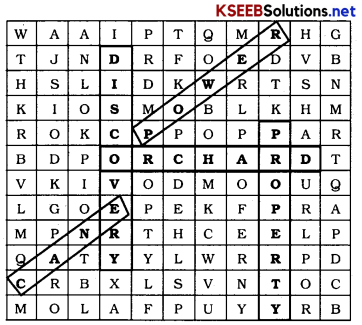
(4) : a long thin stick – CANE
(9) : finding something that was not known earlier – DISCOVERY
(8) : thing/things that someone owns – PROPERTY
(7) : a place where fruit trees are grown – ORCHARD
(5) : ability to control people – POWER.
![]()
Task-2:
Find out the words in the given word maze and match with their meanings. Read across, down and diagonally.
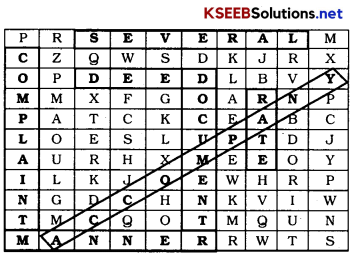
(9): to go with someone – ACCOMPANY
(6) : the way in which something is done – MANNER
(8) : official record – DOCUMENT
(9) : unhappy about something – COMPLAINT
(4) : price – RATE
(7) : many (across) – SEVERAL
(4) : agreement – DEED
Listen and Comprehend
Task-1: The teacher reads the passage. Listen carefully and draw a route map in your note book while listening to your teacher.
Suresh arrives at Bengluru city Railway Station at 6-00 a.m. He intends to go to Chinnaswamy Stadium. He doesn’t like to take either a bus or an auto rickshaw. He decides to go on foot. He walks 10 meters towards South and takes a left turn near Shanthala Silk House. Then he walks down the road, towards East, passes Upparapet Police Station, and again takes a very short left turn and continues his walk towards East on the pavement of Kempegowda road until he reaches a circle near St. Martha’s Hospital. From here he walks towards North in front of Vidhana Soudha. After 5 meters, he walks towards his right and reaches Chinnaswamy Stadium.
Answer:
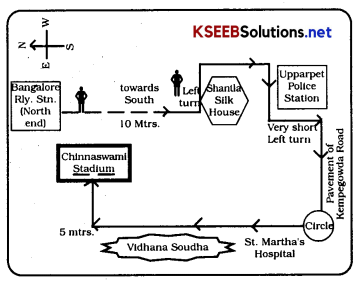
Speak Well
Task-1 :
Here is an imaginary conversation between the old man and the story teller in the act of negotiation. Take roles and say it. Note the underlined expressions. They are used to seek ones opinion.
Story Teller :Good morning, Don Anselmo.
The Old man :Very good morning.
Story Teller :Please be seated.
The Old man :Thank you ( he sits)
Story Teller :The weather is fantastic today, isn’t it?
The Old man : Of course. Well, you sent for me. What’s the matter?
Story Teller :You know. We’re thinking of buying a site for our American friends.
Please meet them (He introduces them to each other. They shake hands)
I heard you want to sell your land across the river. Am I right?
The Old man : You’re right. That’s just what I‘m thinking about.
Story Teller : If you don’t mind, please quote your price.
The Old man : Sure. It’s twelve hundred dollars.
Story Teller :You mean twelve hundred dollars for the entire site?
The Old man :That’s exactly what I mean. Do you agree with the price?
Story Teller :No. I was only thinking that the land is really worth more than what you have quoted. How about 20,000 dollars?
(turns towards his American friend) Friend, what’s your opinion?
Friend: I do agree with your quote. Of course
Story Teller :Would you care to accept my price?
The Old man :(seeming to be hurt) Friend, I don’t like to have you speak to me in that manner. Very sorry.
Story Teller :(Apologetically) Excuse me please. I never meant to hurt you. If I did, I’m terribly sorry. What do you think you would do?
The Old man:All right. Please see. I know the Americans. They’re very generous, But I don’t like to be insulted. If I say 12 hundred dollars, it is the price. I don’t need a cent more.
Story Teller :Thank you. Here’s 12 hundred dollars. A cheque, if you don’t mind.
The Old man :Not at all ( he takes the cheque and signs the bond)
![]()
Task-2:
Write a dialogue by using some of the given phrases asking for the listener’s opinion to an imaginary offer.
Answer:
Raju: How about you taking this offer ?
Ravi: Oh! Very glad.
Raju: Would you like to comment on ?
Ravi: It is very lovely and useful book.
Raju: What’s your opinion ?
Ravi: Certainly it is a good book and very useful. One should possess it.
Raju: Thank you.
Self-Assessment
Read the statement and put a tick mark in the appropriate box.
Answer:
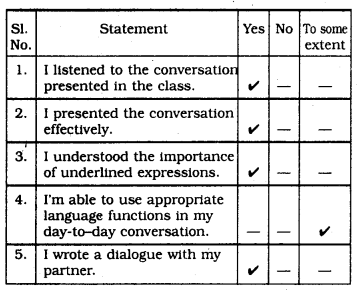
Read and Respond
Task-1:
Read the passage carefully and answer the questions set on it.
A small crowd had gathered around the entrance to the park. His curiosity aroused, Robert crossed the road to see what was happening. He found that the centre of attraction was an old man with a performing monkey. The monkey’s tricks, he soon discovered, were in no way remarkable. So, after throwing a few pennies in the dirty hat which the man had placed on the pavement, Robert moved off, along with other members of the crowd.
At this point the man suddenly let out a loud cry. Everyone turned to see what had happened. The man was bending over his monkey, which now lay quite still on the pavement. He picked up the apparently lifeless body and holding it close to him, began to weep. A young man stepped forward from the crowd and taking some money from his pocket, dropped it into the hat. Robert and several other people did likewise, until the pennies in the hat were covered with silver coins. Meanwhile the man continued to hold the dead monkey in his arms and seemed to take no notice of what was going on about him.
A few months later, Robert came across the old man, again in another part of the city. The man had a monkey, bought no doubt, with the money the crowd had given him. It did not, however, seem any better at its tricks than the previous one. Robert was pleased to see that the old man was still able to earn a living, though on this occasion having partly paid for the monkey out of his own pocket, he did not feel inclined to throw any money into the hat.
![]()
But the performance was not yet over. Once again the old man let out a loud cry. Once again the monkey lay still on the pavement. The man picked up the “dead” monkey and clutching it in his arms began to weep. The same young man stepped forward and threw some money into the hat. Again the crowd followed suit -except Robert. Smiling to himself, he went on his way, amazed at the man’s audacity.
Question 1.
Robert went to the other side of the road because
(a) he wanted to help the old man by giving him some money
(b) he wanted to see why the crowd had gathered
(c) he was curious to watch the monkey’s tricks
(d) he had seen one of his friends over there
Answer:
(b) he wanted to see why the crowd had gathered.
Question 2.
The word “ pavement “ in the fifth line of para 1 is ………
(a) a temporary tent which is used for public entertainment
(b) a path at the side of the road for people to walk on
(c) a small building made of wood
(d) a shelf on the road
Answer:
(b) a path at the side of the orad for people to walk on.
Question 3.
The old man let out a loud cry suddenly in order to
(a) keep the monkey quiet for some time
(b) let the crowd know that his monkey was dead
(c) let the crowd know that he was a poor man
(d) show that he was hurt
Answer:
(b) let the crowd know that his monkey was dead.
![]()
Question 4.
Why did the old man begin to weep?
Answer:
To show that his monkey was dead.
Question 5.
What wise thing did Robert do after he watched the monkey’s tricks for the second time?
Answer:
He was amazed and smiled at the man’s audacity.
Practise Writing
Task-1:
You have some money in your savings account in a nationalised Bank. Now you need some money to buy books. You can withdraw . money from the bank by presenting a cheque to the Bank. How do you fill in the cheque? Here is an example.
Answer:

Task-2 :
You can write a cheque in the name of Ankita for rupees one thousand. Keep note of the following while writing the cheque.
(a) Write the name carefully.
(b) Cross the cheque by drawing two diagonal lines on the left hand top corner of the cheque if it is an account payee cheque.
(c) Signature should be the same as the specimen signature with the bank.
(d) Write the amount both in words and figures.
Answer:

Learn Grammar Through Communication
‘If clause Is used when
1. It is possible to fulfil conditions. (Open condition- type 1 condition)
2. It is theoretically possible to fulfil conditions. (Improbable condition type 2 condition)
3. It is impossible to fulfil conditions, (impossible condition type 3 condition)
Examples of TYPE 3 are given for you.
Study the given situations. They suggest that it is impossible that the condition will be fulfilled as it refers to the past. One is done for you.
![]()
Task-1:
Rohini and her friends were on a picnic. They couldn’t take photographs as John forgot to carry his camera. How did John express his feelings?
Rohini: John, did you bring your camera?
John : Oh! Sorry.
Rohini: It’s O.K.
John : If I had brought my camera we’d have taken some photographs
Task-2 :
Complete Hemanth’s mother’s reaction
Answer:
Hemanth moved to the edge of the compound to pluck guava fruits. He lost balance, fell down and broke his leg. His mother said, “If you had not moved to pluck fruits, you would have been safe.”
Task-3:
In the inter-school cricket match, the captain of your school team chose only one fast bowler. As a result, your team lost the game.
Answer:
Your reaction : If the captain of our team had chosen two fast bowlers, they would not have lost the game.
Task-4 :
Monsoon rains failed. Farmers couldn’t grow crops. Newspaper reported:
Answer:
Had it rained timely, the farmers could have got good crops.
Task-5 :
Shanthanu scored less marks in English. Therefore he couldn’t get a seat in the college he wanted.
Answer:
Guess the response of his father: If Shantanu had scored more marks in English, he could have got a seat in the College he wanted.
Task-6:
Chitra: You missed the train, didn’t you ?
Answer:
Saina: Yes. I went to the railway station at 10.30.a.m. But the train had left at 10.15.a.m.
Chitra: If you had gone to the station at 10 a.m you wouldn’t have missed the train.
Make Reference
Task-1:
The given table provides you information about the services offered at different counters in a Bank. Read the table and also the paragraph given below. Answer the question

One of the Americans wished to buy 2 acres of land. The oldman quoted rupees 50,000 for his land. But, the American didn’t have enough money with him. He requested his friend to help him with money. He sent a cheque for rupees 20,000 to the American. The American went to a Bank for a loan. The Bank manager asked him to open an account which he did. The old man wanted the American to pay the price for the land only in the form of a demand draft. The old man invested 50% of the amount which he received from the American on deposits. Which counter did the American and the oldman approach for the following? Fill in the box provided. One is done for you.
Answer:
a. to submit loan application form [03]
b. to present the cheque [06]
c. to receive money [05]
d. to know more about services offered [01]
e. to invest on deposits [06]
f. to open an account [02]
g. to get a demand draft [04]
h. to submit filled in challan for demand draft [04]
![]()
Do the Project
Collect information on some of the trees which are grown in India and write a short essay on them.
Answer:
The Indian forests have a large variety of trees, which is due to the unequal distribution of temperature and rainfall, as well as their seasonal variation. It is estimated that India has about 46,000 different species of plants. Out of this about 5000 species are exclusively Indian. Out of about 5000 species of trees in our country, about half of them are timber trees. We study the uses of some important trees in India.
Sal:

The wood is hard, heavy, tough and extremely durable. It is widely used for beams, planking, railway sleepers, boat making and as building material for making doors and windows
Teak:
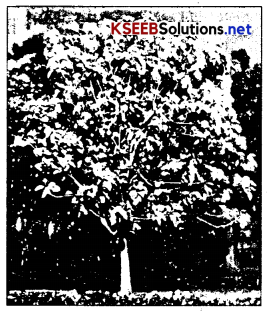
The wood is moderately hard, durable, and easy to work and takes a good polish. It is mainly used for ship building, furniture making, railway carriages, sleepers, bridges, doors and windows.
![]()
Shisham:
The wood is hard, heavy and medium textured. Due to its strength, elasticity and durability, it is valued as constructional and general utility timber, and also used for furniture making, bullock carts, farm implements, musical instruments and railway sleepers.
Haldu:
The wood is hard, durable and of light colour, which is used for toy-making and woodcarving.
Mahua:
Us fruit is used for extracting oil and flowers for wine making
Semul:
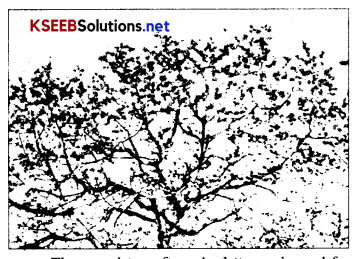
The wood is soft and white and used for making toys, packing cases, match boxes and plywood. Its fruits yield soft fibre for pillows.
Rosewood:
The wood is hard and fine-grained and is used in furniture making, gun-carriage wheels, floor boards, etc. It is suitable for carving.
![]()
Ebony:
The wood is heavy, straight-grained and even textured. It is costly and used for ornamental carving, veneers, inlaying, musical instruments, sports goods, piano keys and caskets.
Deodar:
The wood is light-yellow brown colour, which is sturdy in use. The timber is used for construction work, railway sleepers, beams, floorboards, window frames and light furniture.
Chir:
The wood is light reddish brown, moderately hard and is largely used for making tea chests, matches and furniture. It also yields resin and turpentine.
Blue Pine:
The wood is pink in colour, moderately hard and is used for making doors, windows, and furniture and railway sleepers. It also yields resin and turpentine.
Silver Fir:
The wood is soft, but not very durable.
It is mostly used for planking, packing boxes, containers, wood-pulp, paper and match sticks.
![]()
Spruce:
The wood is soft and white. It is used for construction work, railway sleepers, cabinet making, packing cases and wood pulp.
Walnet
The wood is light, works easily and is used for cabinet work, carving and musical instruments.

White Willow:
The wood is used for making cricket bats and its twigs are used for making baskets.
Birch:
The wood is greyish in colour and is largely used for plywood, furniture and radio cabinets.
Cypress:
The wood is durable and is used for making furniture.
![]()
Chaplas:
The timber is strong and durable and hence in demand for ship building, furniture and packing boxes.
Mulberry:
The wood is soft and durable. It is used for making sports goods, such as hockey sticks; tennis, badminton and squash rackets and cricket stumps. The leaves are used for rearing silkworms.
Bamboos:
It is called the poor man’s timber and is used for a variety of purposes, such as basket making, roofing and thatching material, construction work and pulp making.